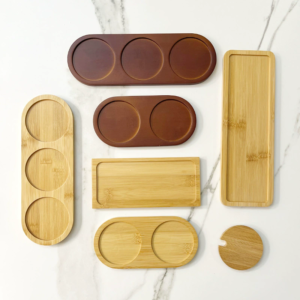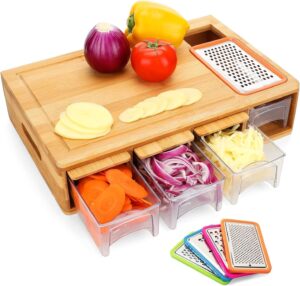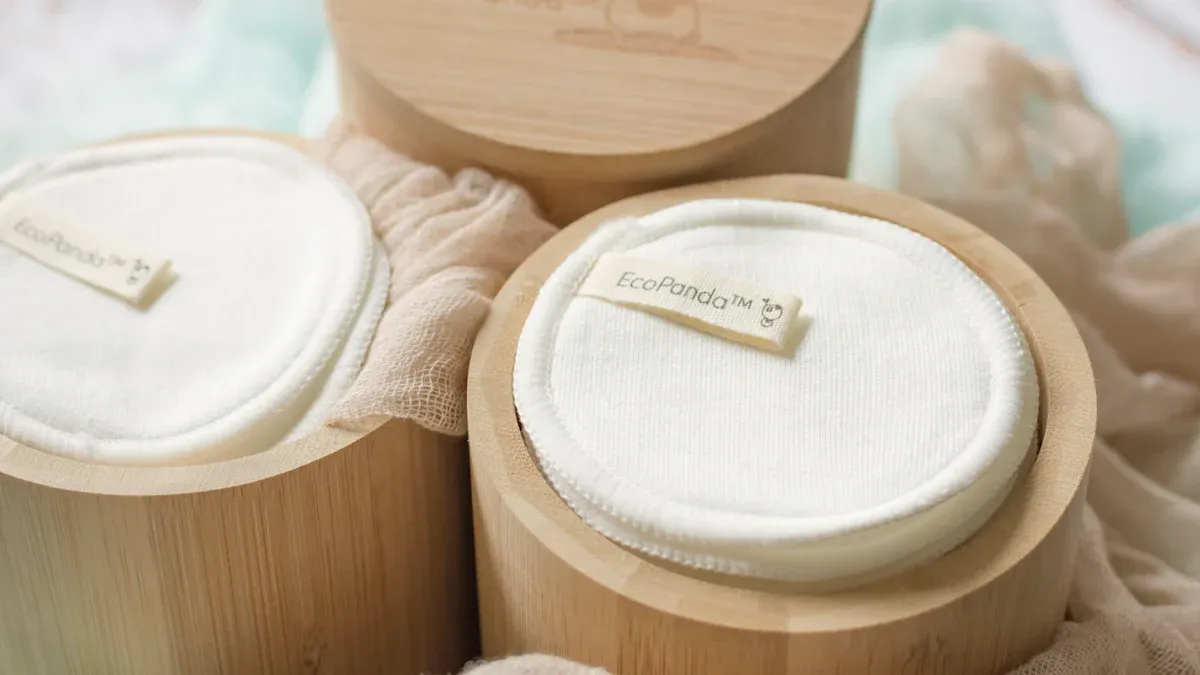
You can make a big difference in your home by choosing bamboo storage containers. These bamboo storage containers offer a sustainable alternative to plastic and help you lower your environmental impact. Since bamboo grows quickly and requires minimal water, using bamboo storage containers supports an eco-friendly lifestyle. By incorporating bamboo storage containers into your space, you bring in a natural material that many people trust for its strength and safety in daily use.
Tip: Bamboo storage containers also add a fresh, stylish look to your kitchen or living room.
Eco-Friendly Advantages of Bamboo Storage Containers
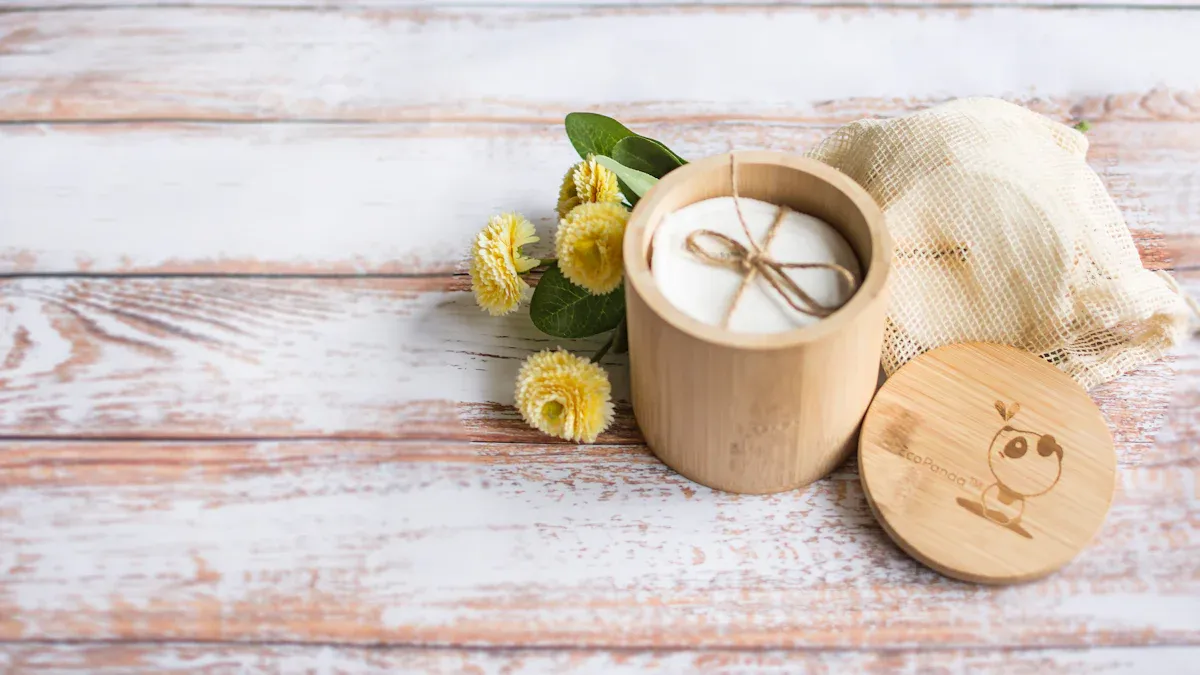
Reducing Plastic Waste at Home
You can make a real difference in your home by choosing bamboo storage containers instead of plastic ones. When you use bamboo, you help cut down on the amount of plastic waste that ends up in landfills and oceans. Scientists have created biodegradable food containers from bamboo fibers and sugarcane pulp. These containers start to break down after just 30 days and almost disappear within 60 days in natural conditions. In comparison, many compostable plastics need special industrial processing to break down. This means bamboo storage containers offer a practical, eco-friendly option for reducing plastic waste at home.
Did you know? Bamboo plates and containers can fully decompose within six months, leaving behind only small bits of debris. This helps keep the environment clean and supports policies that ban single-use plastics.
Many families now use reusable bamboo products, such as lunchboxes and straws, to replace single-use plastic items. These sturdy containers work well for everyday needs, including packing lunches for school or work. By switching to bamboo, you support sustainability and help protect the planet for future generations.
| Aspect | Environmental Benefits |
|---|---|
| Biodegradability | Bamboo containers decompose quickly under normal conditions. |
| Plastic Waste Reduction | Bamboo can replace disposable plastic containers and plates. |
| Chemical Safety | Bamboo avoids harmful chemicals found in some plastics. |
| Practicality | Bamboo containers are affordable and easy to use. |
Natural Antimicrobial and Chemical-Free Properties
Bamboo stands out for its natural antimicrobial properties. The plant contains special agents, like bamboo kun, that make it hard for bacteria to grow. Scientific studies show that bamboo can fight off common bacteria such as E. coli and Staphylococcus aureus. This makes bamboo storage containers a safer choice for storing food and other household items.
You do not need to worry about harmful chemicals with bamboo. Unlike some plastics, bamboo does not contain PFAS or other “forever chemicals” that can harm your health and the environment. You can keep your food fresh and safe without extra worries. To keep the antimicrobial benefits strong, remember to clean and dry your bamboo containers after each use.
- Bamboo’s antibacterial agents include lignin and phenolic compounds.
- These agents disrupt bacteria and help keep your containers hygienic.
- Proper care, such as avoiding soaking, helps maintain these benefits.
Supporting a Circular Economy
When you choose bamboo storage containers, you support a circular economy. Bamboo grows quickly and absorbs a lot of carbon from the air. It is a renewable resource, so you do not have to worry about running out. Sustainability reports highlight that bamboo products are durable, biodegradable, and come from a resource that can be renewed again and again.
Bamboo storage containers fit perfectly into a system where you reuse, recycle, and reduce waste. After their long life, these containers break down naturally, returning to the earth without polluting it. This cycle helps reduce the need for new raw materials and lowers the impact on the environment. By using bamboo, you help create a world where resources are used wisely and waste is kept to a minimum.
Choosing bamboo is not just about storage. It is about making a positive impact on the planet and supporting eco-friendly living.
Environmental Problems with Plastic Storage Solutions
Plastic Waste and Pollution
You see plastic storage containers everywhere, but they create big problems for the environment. When you throw away plastic containers, they often end up in landfills or oceans. These plastics do not break down easily. They can stay in the environment for hundreds of years. Many environmental groups, such as Break Free From Plastic, say that single-use plastics are a major cause of pollution. They want people to use less plastic and choose better options.
- Plastic pollution starts with making the plastic and continues through its disposal.
- Incinerating plastic releases toxic chemicals into the air, which harms both people and the planet.
- Recycling does not solve the problem because most plastics do not get recycled.
- Plastic pollution leaks into oceans, hurting sea life and entering the food chain.
- The “dig, burn, dump” model of plastic waste benefits companies but damages the environment and public health.
Environmental organizations call for zero waste systems and better product design. They want companies to take responsibility for the entire life of their products. You can help by choosing storage containers made from sustainable materials.
Note: Every time you pick a reusable or biodegradable container, you help reduce plastic pollution and protect the environment.
Health Risks from Plastic Containers
Plastic storage containers can also affect your health. Many plastics contain chemicals like phthalates, BPA, BPS, BPF, PFAS, and DEHA. These chemicals can move from the container into your food, especially when you heat the plastic or use it many times.
- Some chemicals in plastic are known as endocrine disruptors. They can change how your body works.
- BPA has been banned in baby bottles because it can harm the brain and reproductive system.
- BPS and BPF, which replace BPA, may also cause health problems like obesity and cell damage.
- DEHA, found in some plastic wraps, has caused liver tumors in animal studies.
- PFAS can move into food over time and may cause health risks.
- When you heat plastic or use it again and again, it can release microplastics and more chemicals.
- Microplastics have been found in human organs, but scientists are still studying their effects.
Experts suggest you avoid microwaving food in plastic containers. You should use glass, ceramic, or bamboo containers to keep your food safe.
Why Bamboo Is a Sustainable Material
Rapid Growth and Renewability
You might wonder why bamboo stands out as a sustainable material. Bamboo grows at an incredible speed. Some species can grow up to 36 inches in a single day. Most bamboo reaches full size in just three to five years. In comparison, hardwood trees used for storage containers can take decades to mature. When you harvest bamboo, you do not need to cut down the entire plant. You only remove segments, and the plant keeps growing from its roots. This means you get a steady supply of bamboo without harming the environment. Because of this rapid growth, bamboo is a renewable resource that can be harvested again and again.
Bamboo’s fast growth and ability to regenerate make it a smart choice for anyone who wants a sustainable alternative to traditional materials.
Minimal Water and No Pesticides Needed
Bamboo farming uses very little water. You do not need to worry about heavy irrigation or draining local water supplies. Unlike many crops, bamboo thrives with minimal fertilizer. Most farmers use organic options like compost or aged manure. Pesticides are rarely needed because bamboo naturally resists pests. This means fewer chemicals enter the soil and water. You help protect the environment when you choose bamboo products for your home. The low need for water and chemicals supports sustainability and keeps ecosystems healthy.
- Bamboo uses less water than most crops.
- Farmers rarely use pesticides, keeping the soil clean.
- Minimal fertilizer is needed, and organic options work best.
Biodegradability and End-of-Life Benefits
Bamboo storage containers offer impressive end-of-life benefits. When you finish using a bamboo container, you can compost it. In the right conditions, bamboo breaks down in just four to six weeks. Even if left outside, bamboo will decompose in five to ten years. Plastic containers, on the other hand, can take hundreds of years to break down. Bamboo products are fully biodegradable and do not release harmful chemicals as they decompose. You can even recycle or repurpose old bamboo containers. This helps reduce waste and supports a cleaner planet. By choosing bamboo, you help close the loop and make a positive impact on the environment.
Choosing bamboo means you support sustainability and enjoy the benefits of a material that returns safely to nature.
Bamboo Storage Containers vs. Plastic and Other Materials
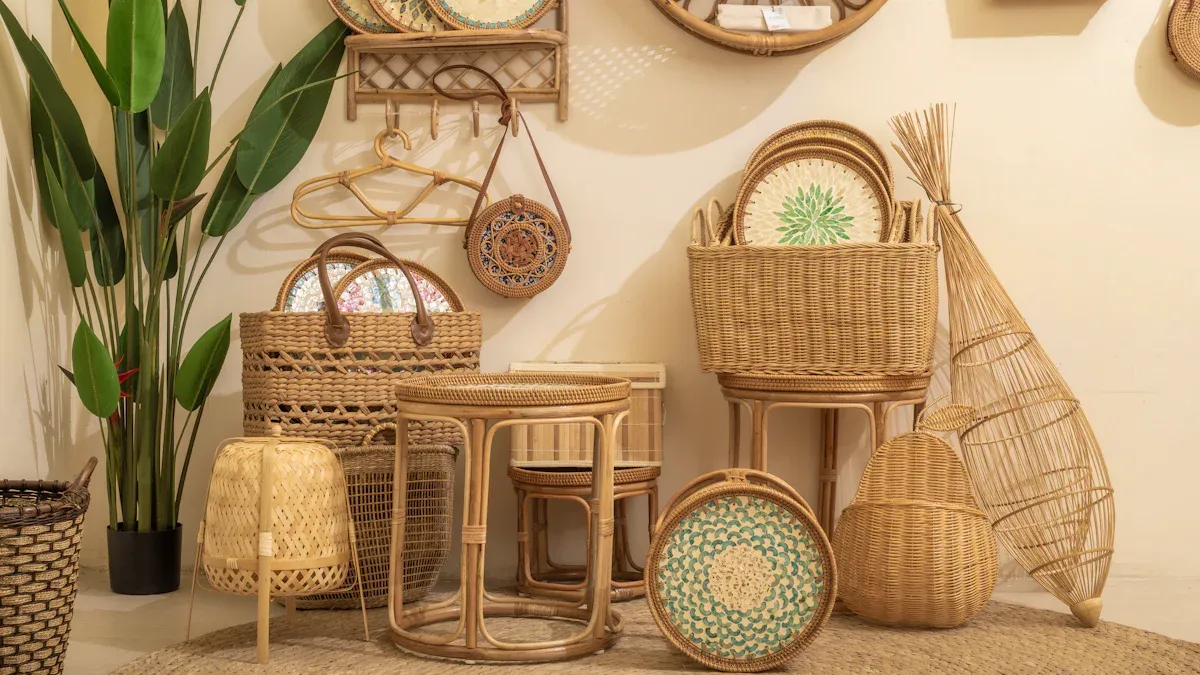
Durability and Longevity
When you choose bamboo food containers, you get a product that lasts much longer than most plastic options. If you take care of your bamboo food containers, they can last over 20 years. Many people find that bamboo containers resist moisture, insects, and mold. This makes them a smart choice for kitchens and pantries. In comparison, plastic containers often need replacement every 2 to 3 years. They can warp, stain, or break down over time. You can extend the life of your bamboo food containers by storing them in cool, dry places and using food-grade mineral oil. This means you save money and reduce waste over time.
- Bamboo food containers: Last over 20 years with proper care.
- Plastic containers: Usually last only 2 to 3 years.
- Bamboo food containers resist moisture, insects, and mold.
- Proper care helps bamboo food containers stay strong and useful.
Health and Safety for Bamboo Food Containers
You want your food storage to be safe and healthy. Bamboo food containers offer a non-toxic and eco-friendly option. They do not leach harmful chemicals into your food. Many bamboo food containers are also biodegradable, which helps protect the environment. Some plastic containers can release chemicals like BPA, especially when heated or used for a long time. Bamboo food containers use natural antibacterial properties to keep your food fresh. Food safety standards like FDA and LFGB show that many bamboo food containers meet strict health requirements. You can ask for test reports from manufacturers to make sure your bamboo food containers are safe. Always choose containers that are BPA-free for extra peace of mind.
- FDA: Checks if bamboo food containers are safe for food contact.
- LFGB: A German standard that is even stricter than FDA.
- BPA-Free: Means no harmful BPA chemicals in your bamboo food containers.
Tip: Always check for safety certifications when you buy bamboo food containers.
Aesthetic and Modern Appeal
Bamboo food containers add a natural and stylish look to your home. Many people like the warm, rustic feel that bamboo brings to kitchens and living rooms. You can find bamboo food containers in many shapes and sizes, which fit well with modern design trends. These trends favor simple, clean lines and eco-friendly materials. Bamboo products are lightweight but strong, making them easy to use every day. Some bamboo food containers have unique designs, like collapsible racks or modular organizers, that help you save space. People often choose bamboo food containers because they look good and show you care about the environment.
- Bamboo food containers match modern, minimalist styles.
- They add a touch of nature to your home.
- You can find bamboo food containers with special features for better organization.
Note: Bamboo food containers are not just practical—they also make your home look fresh and inviting.
Practical Benefits of Bamboo Storage Containers in the Home
Versatility for Home Organization
You can use bamboo storage containers in almost every room. Home improvement experts recommend them for organizing cords, craft supplies, kitchen utensils, knives, spices, and other small items. These containers help you separate and protect your belongings, making your home safer and less cluttered. Many bamboo storage containers come with adaptable designs, such as expandable sizes or stackable shapes. You can fit them into drawers, closets, or shelves with ease. Bamboo utensil organizers are especially popular in kitchens, keeping tools neat and easy to find. The natural look of bamboo matches many design styles, so your storage solutions look good and work well.
- Organize kitchen utensils, spices, and knives
- Store craft supplies and cords safely
- Fit containers in drawers, closets, and shelves
- Enjoy a clutter-free and stylish home
Cost-Effectiveness Over Time
When you choose bamboo storage containers, you make a smart investment. Bamboo is strong and durable, so your containers last for years. You do not need to replace them as often as plastic ones. The stackable design helps you use space more efficiently, which means you buy fewer containers overall. Bamboo food containers also resist stains and odors better than plastic, so you keep your food fresh and avoid waste. Over time, these benefits save you money and reduce the need for frequent replacements.
Tip: Bamboo’s durability and resistance to stains help you get more value from every purchase.
Easy Care and Maintenance
You can keep your bamboo storage containers in great shape with simple care. Clean them with mild dish soap and water using a soft cloth. Avoid soaking them to prevent warping. Always dry them well after washing. For extra protection, apply food-grade mineral oil or beeswax polish every few months. This keeps the bamboo looking shiny and prevents cracks. If you see any small splits, you can fix them with natural wood glue. These easy steps help your containers last longer and keep their natural beauty.
Bamboo food containers do not absorb odors or stains as easily as plastic, so your storage stays fresh and clean.
You help the planet when you pick bamboo storage containers for your home. Bamboo grows fast, needs little water, and does not require pesticides. It produces more oxygen than trees and helps keep soil healthy. These containers break down naturally, so you avoid adding waste to landfills. You also save money over time because bamboo lasts longer than many other materials. By making this sustainable choice, you support a cleaner environment and a healthier home for your family.
FAQ
What makes bamboo storage containers eco-friendly?
Bamboo grows quickly and does not need much water or pesticides. You help reduce plastic waste when you use bamboo containers. Bamboo products break down naturally, so they do not pollute the environment.
Can you use bamboo containers for food storage?
Yes, you can use bamboo containers for food. Many bamboo containers meet FDA and LFGB safety standards. They do not release harmful chemicals into your food. Always check for food-safe labels before buying.
How do you clean bamboo storage containers?
Use mild dish soap and warm water. Wipe with a soft cloth. Dry the container right away. Do not soak bamboo in water. For extra care, apply food-grade mineral oil every few months.
Are bamboo storage containers durable?
You get strong and long-lasting storage with bamboo. With proper care, bamboo containers can last over 20 years. They resist moisture, stains, and odors better than many plastic options.
Do bamboo containers have a smell?
Most bamboo containers have a light, natural scent at first. This smell fades after a few washes. If you notice any odor, wash the container with baking soda and water to remove it.

